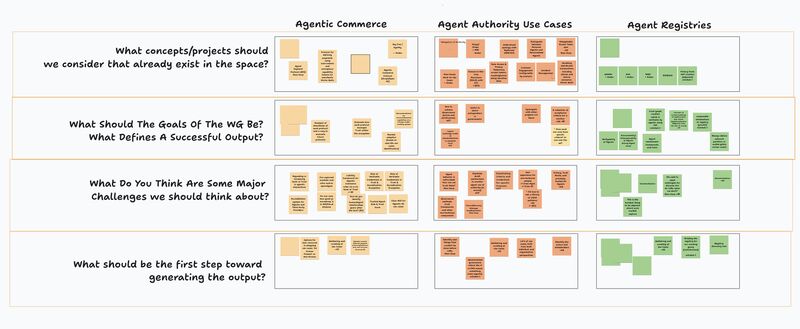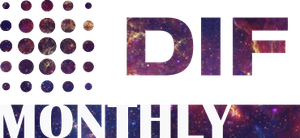October 2025
DIF Website | DIF Mailing Lists | Meeting Recording Archive
Table of contents
- Decentralized Identity Foundation News; 2. Working Group Updates; 3 Special Interest Group Updates; 4 User Group Updates; 5. Announcements; 6. Community Events; 7. DIF Member Spotlights; 8. Get involved! Join DIF
🚀 Decentralized Identity Foundation News
DIF Steering Elections are coming up soon!
We sent out an explainer last week with all the details, but the most urgent reminder is until the 9th, you can:
- Nominate someone else you think would make a great steering committee member (we will reach out to them),
- Self-nominate , and/or
- Submit questions you'd like all candidates to answer.
Keep an eye out for the answers to those questions from the final slate of candidates 16 Sept, and feel free to use the #sc-elections channel on Slack to discuss.
DIF Labs Beta Cohort 2 Concludes with Successful Show & Tell
DIF Labs Beta Cohort 2 concluded with a successful Show & Tell event on September 24, 2025, showcasing three months of development across three innovative projects.
The Anonymous Multi-Signature Verifiable Credentials (ZKMPA) project built a protocol for m-of-n multi-party credential approval while preserving signer anonymity. Using Semaphore with cryptographic membership proofs and nullifiers, the team achieved W3C VCDM 2.0 compatibility and demonstrated how DAOs can issue credentials with privacy-preserving governance.
The Privacy-Preserving Revocation Mechanisms project delivered the first comprehensive comparative study of revocation strategies for W3C Verifiable Credentials, analyzing status lists, accumulators, zk-SNARK proofs, and short-term credentials. The team created a detailed taxonomy and reference implementation benchmarking costs for issuers, holders, and verifiers, with collaboration from the Ethereum Foundation on Merkle-tree approaches.
Legally-Binding Proof of Personhood via QES (QVC) bridged W3C Verifiable Credentials with Qualified Electronic Signatures under EU eIDAS regulation, bringing legally non-repudiable identity to decentralized credentials. The project explored pseudonymous QES flows and ETSI standards compliance for use cases including contracts, academic credentials, healthcare, and financial agreements.
All three projects presented working demonstrations to global participants from Korea, Japan, Europe, and the United States. The community provided structured feedback using the Roses/Buds/Thorns framework, and projects will continue development as open-source implementations. Visit the DIF Labs blog for complete details and event recording.

Trusted Agents Working Group Launches
DIF has launched a new Trusted Agents Working Group to address the emerging challenges of AI agent identity, authentication, and trust. As AI systems gain increasing autonomy and operate across organizational boundaries, the need for robust identity infrastructure becomes critical.
Co-chaired by Andor Kesselman, Nicola Gallo and Dmitri Zagidulin, the working group will develop standards and frameworks ensuring AI agents can maintain verifiable identities, establish trust relationships, and operate with appropriate human oversight. According to Kesselman, "The Trusted AI Agents Working Group focuses on defining an opinionated, interoperable stack to enable trustworthy, privacy-preserving, and secure AI agents."
The inaugural meeting focused on brainstorming use cases and shaping initial focus areas, with the first work item addressing Agentic Authority Use Cases. Read more in Kesselman's LinkedIn post and learn how to get involved here.

Credential Schema Specification 1.0 Released
The Claims & Credentials Working Group, co-chaired by Otto Mora and Valerio Massimo Camaiani, has released Credential Schema Specification 1.0. This specification provides standardized schemas for basic identity credentials, defining the fields required to identify an individual for KYC purposes and other foundational use cases. The 1.0 release ensures schemas are interoperable, extensible, and aligned with existing standards including W3C Verifiable Credentials, OIDC, and schema.org, and includes comprehensive documentation, reference implementations, and guidance for schema developers.
DIF Represented at UNGA Identity Panel
DIF members Matt McKinney and Nicola Gallo spoke on a hands-on panel about digital public infrastructure, trust, and identity two weeks ago, raising awareness and bringing the good word (and up-to-date architectural thinking) to specialists and builders closer to government infrastructure deployments. See last week's blog post for a more detailed read-out.
🛠️ Working Group Updates
Browse our working groups here
Creator Assertions Working Group
The Creator Assertions Working Group continues advancing work on content provenance and authenticity assertions for digital media. Recent discussions have focused on integrating creator assertions with broader verifiable credential frameworks, exploring how content creators can make cryptographically verifiable claims about their work. The group is examining metadata standards that support various content types while maintaining flexibility for emerging use cases. Work continues on alignment with the C2PA ecosystem and development of assertion types that can accommodate both individual creators and organizational content production workflows.
DID Methods Working Group
The DID Methods Working Group focused on updating evaluation criteria for DIF-recommended DID methods. The group refined its assessment framework to emphasize multiple independent implementations, demonstrated production deployments, and clear compliance with core DID traits. Discussions addressed balancing objective technical criteria with expert evaluation to ensure recommendations reflect both standards compliance and practical viability. The group continues work on the proposed W3C DID Methods Working Group charter, addressing community feedback about scope and the role of blockchain-based methods in standardization efforts.
Identifiers and Discovery Working Group
Multiple work streams advanced within the Identifiers and Discovery Working Group. Following the completion of the v1 did:webvh spec, implementations are demonstrating successful interoperability through comprehensive test suites. Performance analysis shows efficient handling of DID document updates even in high-frequency scenarios. The DID Traits team finalized specifications for their 1.0 release, with particular focus on traits related to key validation capabilities and long-term identifier availability. The group explored applications in software supply chain security contexts and examined how DID traits align with emerging regulations including the EU Cyber Resilience Act.
🪪 Claims & Credentials Working Group
Following the successful release of version 1.0 specification, the Claims & Credentials Working Group launched a community schemas initiative. This program creates frameworks for organizations to contribute verifiable credential schemas to a shared repository, with pathways for community review and potential standardization. Recent work includes extending schemas for banking KYC requirements, with particular attention to international postal address formats. The team refined terminology around personhood verification credentials and established processes for synchronizing schemas across multiple repositories. Future development priorities include employment credentials and anti-money laundering certification schemas.
Applied Crypto Working Group
The Applied Crypto Working Group made substantial progress on BBS+ signature schemes and privacy-preserving cryptographic primitives. Key developments include refinements to pseudonym generation approaches, with the team evaluating polynomial methods and their security properties against adversarial scenarios. Discussions addressed post-quantum security considerations and their implications for long-term privacy guarantees in credential systems. The group continues coordination with IETF standardization efforts and is preparing updated test vectors for upcoming draft releases. Members are exploring implementation approaches in both Rust and C++, weighing trade-offs in performance, security, and ecosystem compatibility.
DIF Labs Working Group
With Beta Cohort 2 successfully concluded, the DIF Labs Working Group is evaluating the program structure and considering timing for future cohorts. The group continues providing support to Beta Cohort 2 projects as they transition to ongoing open-source development. Discussions have focused on lessons learned from the cohort model, including the effectiveness of mentorship structures, project scoping approaches, and mechanisms for ensuring long-term project sustainability. The Labs team is also exploring opportunities to showcase project outcomes at industry conferences and standards bodies.
DIDComm Working Group
The DIDComm Working Group advanced work on binary encoding support through CBOR implementation. The team evaluated architectural approaches for supporting multiple encoding formats, considering whether to introduce binary encoding as an optional feature in version 2.2 or as the default in a future major release. Technical discussions addressed message encoding detection, MIME type handling for different encoding schemes, and backward compatibility with existing implementations. The group also explored DIDComm's role in AI agent-to-agent communications, examining how the protocol can support secure, privacy-preserving interactions between autonomous systems.
Hospitality & Travel Working Group
The Hospitality & Travel Working Group made substantial progress on the HAT Pro (Hospitality and Travel Profile) specification. The team developed comprehensive schemas for food preferences, dietary restrictions, and accessibility requirements using graph-based models that eliminate data duplication and improve cross-referencing capabilities. Recent work includes creating UML models and JSON schemas for complex preference structures that can adapt to varied travel contexts. The group is exploring AI-assisted data input mechanisms to simplify the user experience while maintaining data accuracy. Subject matter experts from multiple travel sectors have joined the working group, bringing valuable domain expertise to schema development.
If you are interested in participating in any of the Working Groups highlighted above, or any of DIF's other Working Groups, please click join DIF.
🌎 DIF Special Interest Group Updates
Browse our special interest groups here
DIF Hospitality & Travel SIG
The Hospitality & Travel SIG continued its evolution alongside the working group, focusing on broader ecosystem considerations and real-world implementation challenges. Recent sessions examined the intersection of decentralized identity with emerging AI capabilities in travel, including personalized itinerary generation, automated booking agents, and AI-powered concierge services. The group discussed how traveler-controlled credentials can enable these AI systems while maintaining privacy and user control. Participants also explored challenges in achieving industry-wide adoption of new credential standards, including the need for demonstration projects that showcase tangible benefits to both travelers and service providers.
DIF China SIG
APAC/ASEAN Discussion Group
The APAC/ASEAN group hosted discussions on regulatory developments affecting decentralized identity across the Asia-Pacific region. Key topics included alignment between national digital identity initiatives and decentralized identity standards, with particular attention to interoperability requirements for cross-border transactions. The group examined recent policy changes in Australia, Singapore, and Japan, identifying common themes around privacy protection, user control, and the role of government-issued credentials within broader digital identity ecosystems. Participants discussed strategies for engaging with regulators to ensure decentralized identity approaches are considered in policy development.
DIF Africa SIG
The Africa SIG continues its focus on practical implementations of decentralized identity across the continent. Recent discussions have examined mobile-first approaches to credential management, recognizing that smartphone adoption patterns in Africa differ from other regions. The group explored solutions for users with feature phones or limited connectivity, including offline verification capabilities and SMS-based fallback mechanisms. Participants shared insights on regulatory environments across different African nations and opportunities for harmonization of digital identity frameworks at the regional level.
DIF Japan SIG
The Japan SIG explored technical approaches to AI agent authentication using decentralized identifiers. Discussions covered the unique requirements for identifying autonomous systems, including mechanisms for establishing trust chains between AI agents and their human operators or organizational sponsors. The group examined use cases spanning automated trading systems, customer service agents, and collaborative AI workflows. Participants considered how existing DID methods can be adapted for AI agent use cases and whether new DID methods might be warranted. The group is planning offline events to deepen community engagement and facilitate face-to-face technical discussions.
DIF Korea SIG
📖 DIF User Group Updates
DIDComm User Group
The DIDComm User Group explored practical implementations of the protocol in production environments. Members shared experiences with mediator deployments, discussing scalability considerations and reliability patterns for always-available message routing. The group examined integration approaches with emerging AI communication frameworks, identifying similarities between DIDComm's secure messaging patterns and requirements for AI agent interactions. Discussions also covered developer experience improvements, including debugging tools, testing frameworks, and documentation enhancements that can lower barriers to DIDComm adoption.
📢 Announcements at DIF
Executive Director Applications Still Open
DIF is accepting applications for the Executive Director position as the current term comes to a close. This is an opportunity to shape DIF's strategic direction and lead the organization through its next phase of growth. Application details are available in the job description, with questions welcomed at jobs@identity.foundation.
Decentralized Trust Graph Working Group Launches
The Linux Foundation Decentralized Trust (LFDT), Trust over IP, and Decentralized Identity Foundation have launched a new Decentralized Trust Graph Working Group, providing a venue for developing standards around trust networks and reputation systems in decentralized environments. This working group complements DIF's ongoing work by addressing graph-based approaches to modeling trust relationships. DIF members interested in participating can find details about joining in the ToIP community calendar. This collaboration demonstrates the growing ecosystem of organizations working on complementary aspects of decentralized identity and trust infrastructure.
Discount Codes Available for IIW and Agentic Internet Workshop
DIF members can access special discount codes for two upcoming events:
- Internet Identity Workshop (IIW) XLI: Use code DIF_XLI_20 for 20% off registration at this link
- Agentic Internet Workshop: Use code AIW_DIF_10 for 10% off registration at this link
Explore the DIF Events Calendar for a complete listing of upcoming conferences, workshops, and community gatherings where DIF members will be participating.
🗓️ ️Community Events
Internet Identity Workshop XLI
The semi-annual gathering of the identity community returns, offering unconference-style sessions where participants drive the agenda. IIW continues to be a critical venue for discussing emerging challenges, sharing implementation experiences, and building consensus around identity standards.
Use code DIF_XLI_20 for 20% off registration at this link
Agentic Internet Workshop
The Agentic Internet Workshop takes place immediately following IIW, providing an opportunity to explore how decentralized identity standards can provide the foundation for AI agent interactions and trust. This new workshop addresses the intersection of AI agents and internet infrastructure, with decentralized identity as a key enabling technology. Sessions will explore authentication mechanisms for AI agents, human oversight frameworks, and trust models for agent-to-agent interactions.
Use code AIW_DIF_10 for 10% off registration at this link
🆔 Join DIF!
If you would like to get in touch with us or become a member of the DIF community, please visit our website or follow our channels:
New Member Orientations
If you are new to DIF join us for our upcoming new member orientations. Find more information on DIF’s slack or contact us at community@identity.foundation if you need more information.





